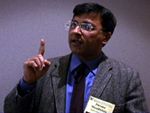February
16, 2001
Fundamentalist Religions and Science:
When science is seen as a subversive activity
by Liza Gross

|
Click
to hear a RealPlayer video clip of Dr. Pervez Hoodbhoy describe
what fundamentalist Islamic science is.
|
With
the recent election of a president with close ties to the religious
right and the moves by local school boards in Kansas to adopt creationist
textbooks, science teachers have
reason
to be nervous. While science has often presented a challenge to traditional
cultures, these recent examples in a western democracy suggest the
problem transcends national boundaries—and will not easily be
resolved.
Perhaps
the most dramatic illustration of this challenge, however, is found
in Islamic fundamentalist states such as Pakistan. Speaking to an
overflow crowd at an early-morning symposium, Pervez Hoodbhoy, a professor
of high-energy physics at Quaid-e-Azam University in Pakistan, described
the historic and current climate for scientists in his homeland. Hoodbhoy
admitted even he was surprised that “four hundred years after
the scientific revolution, we are still fighting the forces of unreason.”
In an
Islamic state, he explained, religion is the absolute law of the land,
above any political constitution, and above all knowledge, including
scientific knowledge. The first thing a child learns to read in Pakistan
is the
Koran,
which says God uses meterorites to punish sinners and that earthquakes
happen to people because they are bad. The Koran can never be wrong
because it is the word of God. “Several hundred people languish
in prison under the accusation of blasphemy,” said Hoodbhoy,
“for which the minimum penalty is death.”
It is
under this climate that scientists pursue their work. But how do such
religious ideas relate to the natural world? “Orthodoxy sees
science as a pathogenic substance,” rejecting any possibility
that diseases have material causes, said Hoodbhoy. Sounding eerily
like Jerry Falwell’s declaration that AIDS is “God’s
punishment,” fundamentalist Muslims, Hoodbhoy said, insist that
AIDS is a “divine recognition of immoral behavior and is, therefore,
incurable.”
But if science is a pathogen to fundamentalists, to Hoodbhoy it is
a Trojan horse: “Science has an attractive exterior, with cell
phones and other modern conveniences, but inside lies the means to
attack the germs of orthodoxy.” And so with the protection—and
perhaps distraction—that the trappings of technology afford,
Hoodbhoy hopes that scientists stand their ground and resist fundamentalists’
attempts to control the pursuit and teaching of scientific knowledge.
“Science can only be a Trojan horse,” he said, “if
there are Trojans inside us.”
<<Back
to Dispatches